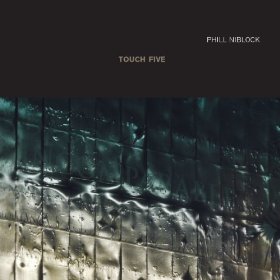Phill Niblock deserves to be considered the foremost theoretician of minimalism currently composing and releasing music. As he enters his ninth decade, I can’t think of another significant active composer still mining minimalism potential for single-mindedness and aesthetic absolutism with quite the same dedication. Listening to Niblock is to surrender one’s perception to his, to allow focused, immutable tones to wash away all other sensations. Where many other minimalist composers have retreated into isolation, or adapted their art to commercial sensitivities, Niblock continues to centre his work on the very fundamentals of music: tone, tuning and duration. His pieces can be challengingly lengthy, but they never fail to get under the skin and induce new ways of hearing sound.
Touch Five, therefore, does not stand out dramatically from the continuum of Niblock’s previous output, for Touch or other labels. The tracks are long, the changes minimal. It’s as lasting and immutable as Touch Food, from 2003, or 2009’s Touch Strings, and instantly familiar to accustomed listener, the kind of enduring reliability that is perhaps the hallmark of a great composer. Plus, this means every Niblock album is essentially an ideal starting point for newcomers, though they’d better be equipped with open minds.
The reason being that Niblock does not have much truck with dynamics and overt variation; this music, from opener ‘Feedcorn Ear’-onwards, is about stasis and timelessness. It’s made to be listened to on headphones, and as loud as possible, for then, as with the bristling wall noise of Vomir, the inherent textures of the music – perhaps real, perhaps imagined – start to reveal themselves.
‘Feedcorn Ear’ is based on relentless, unmoving string drones that aren’t so much built up as juxtaposed and superimposed. In fact, if you listen to the track on headphones, you can hear the distinct tonal lines in each ear. Imagine what Touch Five would sound like in surround sound at full volume! Bliss, I think. Over thirty minutes, these immovable drones vacillate slowly on top of and around each other, each one extended and sustained until they appear to fill every inch of sonic space, like bees buzzing -admittedly beautifully- inside the listener’s skull. Having seen Niblock’s music performed live, I know how much dedication and attention is required on the part of the musicians, who need to hold notes in space for incredible amounts of time. On ‘Feedcorn Ear’ and its 28-minute follow-up ‘A Cage of Stars’, Niblock uses the most insistent, almost basic, of musicality to create compositions so dense and implacable that they appear to distort and extend time itself. To be honest, apart from Eliane Radigue’s synth epics (such as La Trilogie De La Mort) or the “deep listening” of Pauline Oliveros, no-one I can think of has created music this overwhelmingly focused since The Well-Tuned Piano.
Niblock switches the dynamics somewhat on the three renditions of ‘Two Lips’ that make up the second half of the album, each one performed by a different guitar group. Niblock’s clever score has so much scope that each set of musicians is allowed to, if not bring their own interpretation to the fore, but at least open themselves up to divergent ranges. The result are three tracks of buzzing guitar drone that come on like slower-paced takes on Glenn Branca’s guitar orchestra works, each one subtly but significantly different to the others.
I cannot say if Touch Five is Phill Niblock’s best release to date, because his oeuvre is best considered as a whole, a vision even. If Touch Food was my entry point into this world, Touch Five serves as the next communiqué in what is a rich and exciting expression from composer to listener. If you haven’t yet lent your ear to it, this will make a fantastic discovery.


